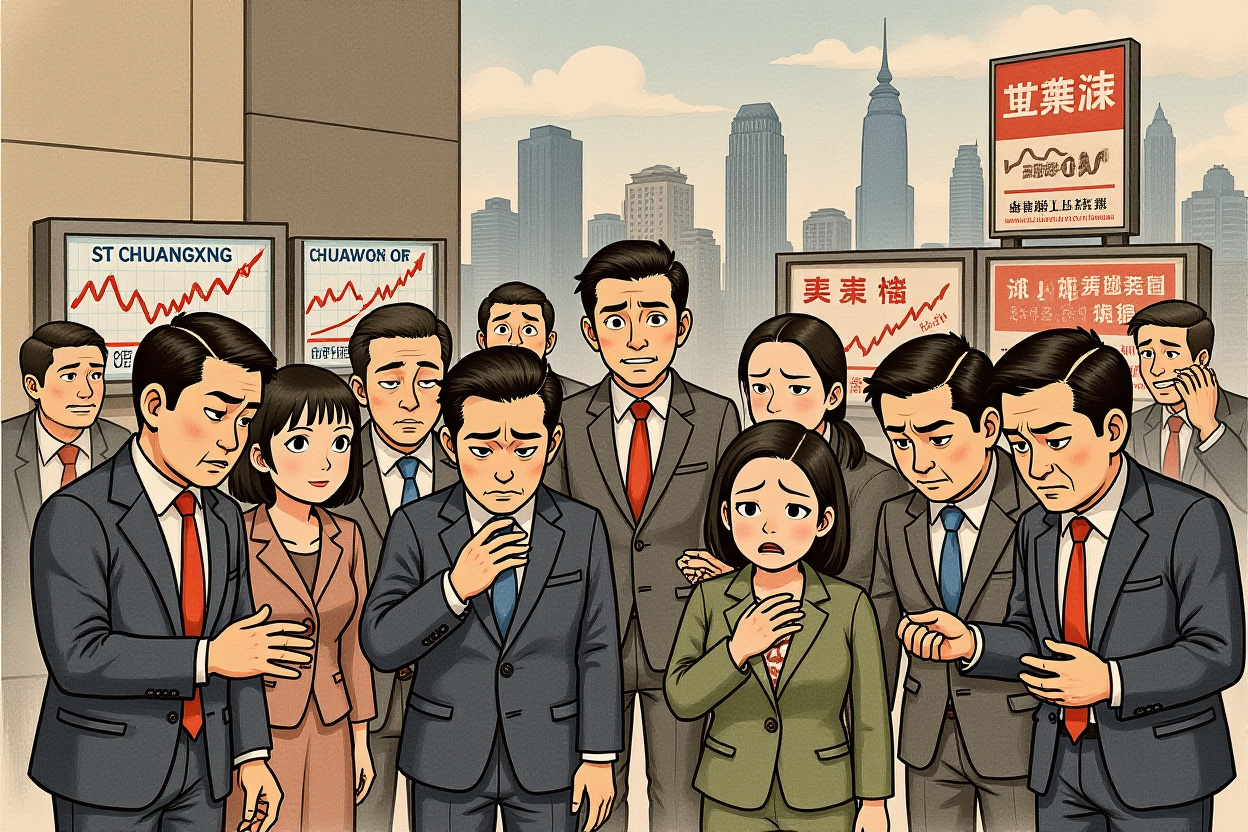Executive Summary
- ST Chuangxing (600193.SH) Chairman Liu Peng, born in 1980, has been detained by Hangzhou police for investigation unrelated to the listed company
- The detention connects to ongoing fallout from former controller Yu Zengyun’s alleged fundraising fraud case that triggered the company’s 2024 collapse
- New acting chairman Yang Zhe faces skepticism about his qualifications after joining the company less than one year ago
- Company revenue plummeted to just RMB 374,000 in first half 2025, down 99% year-over-year
- Control has shifted to Leo Group’s Wang Xiangrong following judicial auction of pledged shares
Leadership Crisis at ST Chuangxing
ST Chuangxing Resources Development Co., Ltd. (600193.SH) faces renewed turbulence as Chairman Liu Peng’s detention by Hangzhou authorities highlights the continuing fallout from former controller Yu Zengyun’s alleged fundraising fraud case. The Shanghai-listed construction and IT services company, which has weathered over a year of crisis since Yu’s disappearance and subsequent fraud investigation, now confronts fresh leadership uncertainty at a critical juncture.
The company’s stock price closed at RMB 4.28 on September 18, representing a market capitalization of RMB 1.821 billion, despite a 26% year-to-date gain that masks underlying operational challenges. The detention of ST Chuangxing’s chairman represents another chapter in the ongoing saga that has plagued the company since its former controller’s legal troubles emerged.
Unexpected Leadership Change
Following Liu Peng’s detention, ST Chuangxing announced that director and general manager Yang Zhe would assume the roles of acting chairman and legal representative. This emergency succession plan raises questions about governance stability, particularly given Yang’s controversial appointment history and limited tenure.
Yang, born in 1980, joined the company in October 2024 after serving in the Chinese People’s Liberation Army from 1998 to 2017 and later leading Beijing Tonglian Juncheng Technology Co., Ltd. His rapid ascent to acting leadership—less than one year after joining the company—has drawn internal skepticism, as evidenced by director Tong Xin’s previous opposition vote regarding Yang’s executive appointment.
Historical Context and Connections
The current leadership crisis cannot be understood without examining the intricate web of relationships connecting detained chairman Liu Peng, former controller Yu Zengyun, and their associated business entities. Liu’s professional trajectory reveals deep ties to Yu’s business empire, creating ongoing vulnerability for ST Chuangxing despite the change in control.
The Overseas Chinese Connection
Liu Peng’s career demonstrates extensive involvement with Yu Zengyun’s Overseas Chinese system companies. From November 2015 to October 2021, Liu served as executive president of Overseas Chinese Fund Management Co., Ltd. (华侨基金管理有限公司). He subsequently held vice president roles at Overseas Chinese Business Group Co., Ltd. (华侨商业集团有限公司) and leadership positions at Zhejiang Qiaohua Trading Co., Ltd. and Henan Jiubianli Commercial Share Co., Ltd.
These appointments within Yu’s business network culminated in Liu’s appointment as president of Overseas Chinese Industrial Co., Ltd. (华侨实业有限公司) and chairman of ST Chuangxing in May 2023, following Overseas Chinese Industrial’s acquisition of controlling stake through a share transfer agreement. The detention of ST Chuangxing’s chairman by the same Hangzhou police division handling Yu’s case suggests continuing investigative connections between the former controller and current leadership.
Financial Implications and Market Impact
The ongoing leadership turmoil and historical connections to alleged fraud have created severe operational and financial consequences for ST Chuangxing. The company’s financial performance has deteriorated dramatically, raising questions about its viability as a going concern without significant restructuring.
Precipitous Financial Decline
ST Chuangxing’s first-half 2025 financial results reveal a company in severe distress. Revenue collapsed to just RMB 374,000, representing a 99% year-over-year decrease. The company reported a net loss attributable to shareholders of RMB 13.71 million, approximately double the loss recorded during the same period last year.
Management attributed this catastrophic performance to multiple factors: the construction engineering business generated no new revenue during the reporting period, while the software and information services business faced operational constraints due to funding pressures and staffing limitations. The detention of ST Chuangxing’s chairman adds another layer of uncertainty to the company’s recovery prospects.
Ownership Transition Through Judicial Auction
The fallout from Yu Zengyun’s legal troubles triggered a transfer of control through judicial auction. In 2025, 67 million shares of ST Chuangxing stock pledged by Overseas Chinese Industrial were divided into five lots and auctioned, generating total proceeds of RMB 234 million.
This auction resulted in Leo Group (002131.SZ) controller Wang Xiangrong gaining indirect control of 9.88% of ST Chuangxing through Fujian Pingtan Yuanchu Investment Co., Ltd. and Wenling Lixin Machinery Co., Ltd. Together with shares held by concerted actors Zhong Renzhi and Yan Yi, Wang now controls 67 million shares representing 15.76% of the company, making him the new controlling shareholder.
Corporate Background and Business Operations
ST Chuangxing Resources Development Co., Ltd. (上海创兴资源开发股份有限公司) listed on the Shanghai Stock Exchange on May 27, 1999. The company operates across three business segments: construction engineering, mobile information services, and computing power services. This diversification theoretically provides multiple revenue streams, though current operational challenges have severely impacted all business lines.
Core Business Challenges
The company’s construction decoration business has historically represented a significant revenue source, though it generated no income during the latest reporting period. Similarly, the mobile information services and computing power services businesses have been constrained by funding and personnel issues. The detention of ST Chuangxing’s chairman creates additional headwinds for business stabilization efforts.
Despite these challenges, the company maintains its listing status while carrying the Special Treatment (ST) designation, indicating abnormal financial conditions or other risk factors that require investor caution. The detention of ST Chuangxing’s chairman represents another risk factor for investors to consider.
Regulatory and Legal Context
The situation at ST Chuangxing occurs against a backdrop of increasing regulatory scrutiny on corporate governance and fundraising activities in China’s capital markets. The case demonstrates how legal issues affecting major shareholders can create lasting repercussions for listed companies, even after ownership changes.
Fundraising Fraud Investigations
Yu Zengyun’s case represents one of several high-profile fundraising fraud investigations pursued by Chinese authorities in recent years. The Hangzhou Public Security Bureau’s Shangcheng District Branch, which is handling both Yu’s case and Liu Peng’s detention, has developed specialized expertise in financial fraud investigations.
According to China’s Criminal Law, fundraising fraud (集资诈骗罪) can result in severe penalties, including life imprisonment in particularly serious cases. The detention of ST Chuangxing’s chairman, while reportedly unrelated to the listed company, suggests investigators continue pursuing connections within Yu’s business network.
Market Reaction and Investor Implications
Financial markets have responded to the ongoing developments at ST Chuangxing with measured concern. The stock declined 2.28% on September 18 following the detention announcement, though it maintains a 26% year-to-date gain that largely reflects market dynamics rather than company fundamentals.
Analyst Perspectives
Financial analysts following Chinese small-cap stocks emphasize the importance of thorough due diligence on controlling shareholders and their business networks. The detention of ST Chuangxing’s chairman, while reportedly unrelated to the company, highlights how governance risks can emerge from historical relationships.
Portfolio managers specializing in Chinese equities note that special treatment stocks often present asymmetric risk-reward profiles. While turnaround potential exists in some cases, the detention of ST Chuangxing’s chairman adds to the already substantial execution risks facing the company.
Path Forward and Strategic Considerations
New controlling shareholder Wang Xiangrong faces significant challenges in stabilizing ST Chuangxing. The company requires operational restructuring, potential recapitalization, and leadership stabilization following the detention of its chairman. Success will depend on addressing both immediate operational issues and longer-term strategic positioning.
Operational Restructuring Options
The company’s dramatic revenue decline suggests need for fundamental business model reassessment. Potential strategies include focusing on core competencies, seeking strategic partnerships, or pursuing asset sales to generate working capital. The detention of ST Chuangxing’s chairman complicates these efforts by creating leadership uncertainty.
Investors should monitor several key indicators in coming quarters: stabilization of leadership following the chairman’s detention, progress in resuming normal business operations, and clarity regarding any continuing legal or regulatory issues connected to former controller Yu Zengyun.
Broader Market Implications
The situation at ST Chuangxing offers important lessons for investors in Chinese small-cap stocks. Companies with complex ownership structures, recent control changes, or connections to troubled business groups warrant additional scrutiny. The detention of ST Chuangxing’s chairman, while reportedly unrelated to the company, demonstrates how historical relationships can create ongoing vulnerability.
International investors should pay particular attention to corporate governance indicators, including board composition, leadership stability, and transparency regarding related-party transactions. The detention of ST Chuangxing’s chairman highlights how quickly governance issues can emerge, even following ownership changes.
As China’s capital markets continue developing, regulators increasingly emphasize corporate governance and shareholder protection. The detention of ST Chuangxing’s chairman, while an individual matter, occurs within this broader context of regulatory enhancement.
Investors should conduct enhanced due diligence on companies with similar characteristics: recent control changes, special treatment status, or connections to businesses facing regulatory scrutiny. While opportunities exist in turnaround situations, the detention of ST Chuangxing’s chairman reminds us that recovery often involves unexpected challenges.
Monitor official company announcements through approved channels and consult with financial advisors regarding appropriate position sizing and risk management strategies. The detention of ST Chuangxing’s chairman represents another data point in assessing investment opportunities in China’s evolving capital markets.




